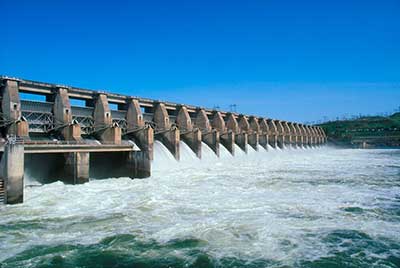Relevance: GS-2: Functions and responsibilities of the Union and the States, issues and challenges pertaining to the federal structure.
Key Phrases: Central Water Commission, River Valley, uncontrolled catchments, wildlife sanctuary, Cauvery Water Management Authority, MoEFCC.
Why in News?
- Karnataka and Tamil Nadu are heading for a political confrontation over the Mekedatu drinking water project across river Cauvery, proposed by the former.
About Mekedatu Project
- Originally mooted in 1948, Mekedatu (which translates as Goat’s crossing) is a drinking water cum power generation project across river Cauvery.
- Karnataka gave the project shape after the final award of the Cauvery Water Disputes Tribunal was notified in February 2013 allocating the riparian states their shares.
- After a pre-feasibility study report was submitted in 2018, the State submitted a detailed project report to the Central Water Commission in 2019.
- The project, which will involve submergence of nearly 5,100 hectares of forest in Cauvery wildlife sanctuary hosting rich flora and fauna, will help the state in utilising the additional 4.75 tmc ft. of water allocated by Supreme Court in 2018 for consumptive use for drinking purpose for Bengaluru and neighbouring areas.
- Karnataka’s share in the award has been decided at 284.75 tmc ft.
- In July 2019, the Expert Appraisal Committee on River Valley and Hydroelectric Projects constituted by the Union Ministry of Environment, Forest and Climate Change (MoEFCC) has said the proposal could be reconsidered only after Tamil Nadu and Karnataka reach an “amicable solution.”

How will it benefit Karnataka?
- The water from Mekedatu is to be pumped to quench the thirst of the burgeoning population of Bengaluru which is estimated to be around 1.3 crore.
- Currently, more than 30% of Bengaluru is dependent on borewell water.
- Ramanagara and Bengaluru rural districts will also benefit. Along with the 5th stage of the Cauvery Water Supply Scheme, which will be completed shortly, the water from Mekedatu is projected to meet the water requirement of the State capital for the next 30 years.
- Besides, there are also plans to generate 400 MW of power.
- The revenue earned from power generation is expected to compensate the Government its investment on the project within a few years.
- Karnataka argues that the reservoir will also help to ensure monthly flow stipulated in the award for Tamil Nadu rather than harm the neighbouring State's interest in any way.
Central Water Commission
- Central Water Commission (CWC) is a technical organisation that functions as part of the Ministry of Jal Shakti in the Government of India.
- They are entrusted with the responsibilities of providing consultation to various state governments on water bodies related issues, coordinate various governmental schemes for conservation, control, and utilisation of water resources.
- Central Water Commission help state governments in devising and analysing flood control measures.
- The three Wings of Central Water Commission are Designs and Research (D&R), River Management (RM) Wing, and Water Planning and Projects (WP&P) Wing.
What are Tamil Nadu’s concerns?
- Tamil Nadu feels that Karnataka, through the project, will impound and divert flows from “uncontrolled catchments” to it, a component which was taken into account by the Tribunal in the 2007 order while arriving at the water allocation plan for the State.
- As per an estimate, around 80 tmc ft of water flows annually to Tamil Nadu, thanks to the catchments including the area between Kabini dam in Karnataka and Billigundulu gauging site on the inter-State border, and the area between Krishnaraja Sagar dam in Karnataka and the gauging site.
- As the upper riparian State has adequate infrastructure even now to address the water needs of Bengaluru, there is no need for the Mekedatu project, according to Tamil Nadu.
- Besides, given the unpleasant experiences that it has had with Karnataka in securing its share of the Cauvery water, as per the monthly schedule of water release, Tamil Nadu is wary of assurances from the other side.
Karnataka’s Stand
- Karnataka says that there is no case for Tamil Nadu after its share of 177.75 tmc ft. of water is ensured at the inter-State border gauging centre at Biligundlu.
- Also, the project falls inside the jurisdictional limit of Karnataka and Tamil Nadu’s permission is not needed.
- The State also argues that since there is no stay in any court for the project, Karnataka can go ahead.
- On utilising the surplus water, Karnataka says that any allocation in this sphere should be done after hydrology studies to ascertain the quantum of excess water available in the basin.
Current Status
- The project is now before the Cauvery Water Management Authority.
- The Authority is exploring the possibility of having an exclusive discussion on the project, when the matter is sub-judice.
- Apart from writing to the Centre to withdraw the permission given to prepare the detailed project report (DPR), Tamil Nadu has also filed a petition before the Supreme Court, explaining its objections against the project.
- The Centre and Karnataka have also filed counter affidavits.
Conclusion
- All signs are that both sides are digging in heels on their separate stands regarding the proposed dam.
- Karnataka insists it is within its rights to go ahead with the construction of the dam while Tamil Nadu is urging the Centre to not grant clearance to the project.
- Dam is a source of development for any state it should not become a point of contention, both the states should resolve the issues amicably.
Sources: The Hindu
Mains Question:
Q. What is the controversy over proposed Mekedatu water project? Suggest a suitable way forward. (250 words ).






















